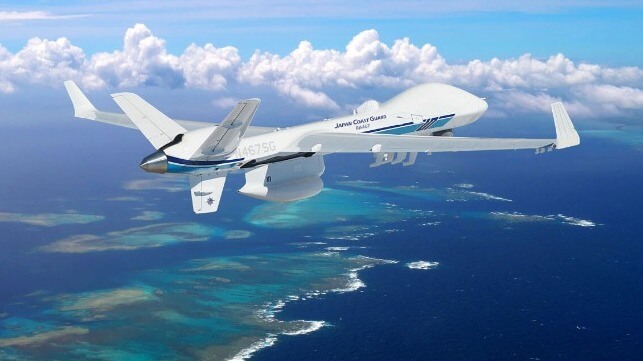Japan Coast Guard Launches Surveillance with Remotely Piloted Aircraft

With tensions running high in the region, the Japan Coast Guard has added a new surveillance tool to expand its capabilities in monitoring the waters off Japan’s northeastern coast. The Coast Guard’s first remotely piloted aircraft (RPA) took flight from the Japan Maritime Self Defense Force (JMSDF) Air Station Hachinohe on October 19.
The Coast Guard selected an MQ-9B SeaGuardian from San Diego-based General Atomics Aeronautical Systems for its first RPA. The Coast Guard reports that it tested the camera and other functions during the inaugural flight. Initially, the craft will primarily perform maritime wide area search (MWAS) over the Sea of Japan and the Pacific Ocean. They will be using the aircraft to monitor for illegal foreign vessels fishing in the Yamatotai ocean bank, a fishing area in the Sea of Japan, as well as monitoring Japan’s Pacific coastal areas.
The craft will be piloted from a ground control station at the guard base with the pilots using the onboard cameras and sensors. They reported that the craft is capable of flying up to 24 hours continuously in all types of weather.
The SeaGuardian has a wingspan of 79 feet and according to General Atomics Aeronautical Systems, it features a multi-mode maritime surface-search radar with an Inverse Synthetic Aperture Radar (ISAR) imaging mode, an Automatic Identification System (AIS) receiver, and High-Definition – Full-Motion Video sensor equipped with optical and infrared cameras. The sensor suite enables real-time detection and identification of surface vessels and provides automatic tracking of maritime targets and correlation of AIS transmitters with radar tracks.
In addition to the long endurance capabilities of the SeaGuardian, the aircraft incorporates collision-avoidance radar that enables flexible operations in civil airspace. The company also highlights that it has an automatic takeoff and landing capability.
The launch of the RPA program comes after the Japan Coast Guard in the fall of 2020 Guard spent $9 million testing the SeaGuardian. Among the elements they were testing was the ability of the cameras to spot people floating in open waters as well as to read the identities of individual vessels. The Coast Guard after the tests incorporated the RPA into its 2022 budget.
Coast Guard officials told reporters during a launch demonstration that if the agency starts operating multiple unmanned planes, they could be used not only for surveillance activities but also in times of maritime accidents.
